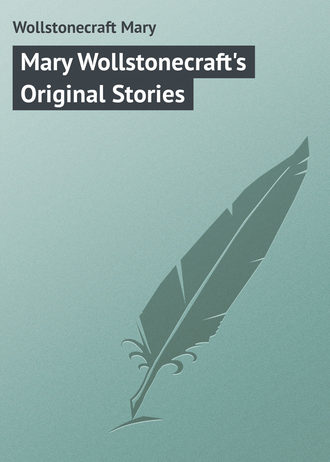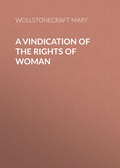
Wollstonecraft Mary
Mary Wollstonecraft's Original Stories
CHAPTER I
The treatment of animals. – The ant. – The bee. – Goodness. – The lark’s nest. – The asses.
One fine morning in spring, some time after Mary and Caroline were settled in their new abode, Mrs. Mason proposed a walk before breakfast, a custom she wished to teach imperceptibly, by rendering it amusing.
The sun had scarcely dispelled the dew that hung on every blade of grass, and filled the half-shut flowers; every prospect smiled, and the freshness of the air conveyed the most pleasing sensations to Mrs. Mason’s mind; but the children were regardless of the surrounding beauties, and ran eagerly after some insects to destroy them. Mrs. Mason silently observed their cruel sports, without appearing to do it; but stepping suddenly out of the foot-path into the long grass, her buckle was caught in it, and striving to disentangle herself, she wet her feet; which the children knew she wished to avoid, as she had been lately sick. This circumstance roused their attention; and they forgot their amusement to enquire why she had left the path; and Mary could hardly restrain a laugh, when she was informed that it was to avoid treading on some snails that were creeping across the narrow footway. Surely, said Mary, you do not think there is any harm in killing a snail, or any of those nasty creatures that crawl on the ground? I hate them, and should scream if one was to find its way from my clothes to my neck! With great gravity, Mrs. Mason asked how she dared to kill any thing, unless it were to prevent its hurting her? Then, resuming a smiling face, she said, Your education has been neglected, my child; as we walk along attend to what I say, and make the best answers you can; and do you, Caroline, join in the conversation.
You have already heard that God created the world, and every inhabitant of it. He is then called the Father of all creatures; and all are made to be happy, whom a good and wise God has created. He made those snails you despise, and caterpillars, and spiders; and when He made them, did not leave them to perish, but placed them where the food that is most proper to nourish them is easily found. They do not live long, but He who is their Father, as well as your’s, directs them to deposit their eggs on the plants that are fit to support their young, when they are not able to get food for themselves. – And when such a great and wise Being has taken care to provide every thing necessary for the meanest creature, would you dare to kill it, merely because it appears to you ugly? Mary began to be attentive, and quickly followed Mrs. Mason’s example, who allowed a caterpillar and a spider to creep on her hand. You find them, she rejoined, very harmless; but a great number would destroy our vegetables and fruit; so birds are permitted to eat them, as we feed on animals; and in spring there are always more than at any other season of the year, to furnish food for the young broods. – Half convinced, Mary said, but worms are of little consequence in the world. Yet, replied Mrs. Mason, God cares for them, and gives them every thing that is necessary to render their existence comfortable. You are often troublesome – I am stronger than you – yet I do not kill you.
Observe those ants; they have a little habitation in yonder hillock; they carry food to it for their young, and sleep very snug in it during the cold weather. The bees also have comfortable towns, and lay up a store of honey to support them when the flowers die, and snow covers the ground: and this forecast is as much the gift of God, as any quality you possess.
Do you know the meaning of the word Goodness? I see you are unwilling to answer. I will tell you. It is, first, to avoid hurting any thing; and then, to contrive to give as much pleasure as you can. If some insects are to be destroyed, to preserve my garden from desolation, I have it done in the quickest way. The domestic animals that I keep, I provide the best food for, and never suffer them to be tormented; and this caution arises from two motives: – I wish to make them happy; and, as I love my fellow-creatures still better than the brute creation, I would not allow those that I have any influence over, to grow habitually thoughtless and cruel, till they were unable to relish the greatest pleasure life affords, – that of resembling God, by doing good.
A lark now began to sing, as it soared aloft. The children watched its motions, listening to the artless melody. They wondered what it was thinking of – of its young family, they soon concluded; for it flew over the hedge, and drawing near, they heard the young ones chirp. Very soon both the old birds took their flight together, to look for food to satisfy the craving of the almost fledged young. An idle boy, who had borrowed a gun, fired at them – they fell; and before he could take up the wounded pair, he perceived Mrs. Mason; and expecting a very severe reprimand, ran away. She and the little girls drew near, and found that one was not much hurt; but that the other, the cock, had one leg broken, and both its wings shattered; and its little eyes seemed starting out of their sockets, it was in such exquisite pain. The children turned away their eyes. Look at it, said Mrs. Mason; do you not see that it suffers as much, and more than you did when you had the small-pox, when you were so tenderly nursed. Take up the hen; I will bind her wing together; perhaps it may heal. As to the cock, though I hate to kill any thing, I must put him out of pain; to leave him in his present state would be cruel; and avoiding an unpleasant sensation myself, I should allow the poor bird to die by inches, and call this treatment tenderness, when it would be selfishness or weakness. Saying so, she put her foot on the bird’s head, turning her own another way.
They walked on; when Caroline remarked, that the nestlings, deprived of their parents, would now perish; and the mother began to flutter in her hand as they drew near the hedge, though the poor creature could not fly, yet she tried to do it. The girls, with one voice, begged Mrs. Mason to let them take the nest, and provide food in a cage, and see if the mother could not contrive to hop about to feed them. The nest and the old mother were instantly in Mary’s handkerchief. A little opening was left to admit the air; and Caroline peeped into it every moment to see how they looked. I give you leave, said Mrs. Mason, to take those birds, because an accident has rendered them helpless; if that had not been the case, they should not have been confined.
They had scarcely reached the next field, when they met another boy with a nest in his hand, and on a tree near him saw the mother, who, forgetting her natural timidity, followed the spoiler; and her intelligible tones of anguish reached the ears of the children, whose hearts now first felt the emotions of humanity. Caroline called him, and taking sixpence out of her little purse, offered to give it to him for the nest, if he would shew her where he had taken it from. The boy consented, and away ran Caroline to replace it, – crying all the way, how delighted the old bird will be to find her brood again. The pleasure that the parent-bird would feel was talked of till they came to a large common, and heard some young asses, at the door of an hovel, making a most dreadful noise. Mrs. Mason had ordered the old ones to be confined, lest the young should suck before the necessary quantity had been saved for some sick people in her neighbourhood. But after they had given the usual quantity of milk, the thoughtless boy had left them still in confinement, and the young in vain implored the food nature designed for their particular support. Open the hatch, said Mrs. Mason, the mothers have still enough left to satisfy their young. It was opened, and they saw them suck.
Now, said she, we will return to breakfast; give me your hands, my little girls, you have done good this morning, you have acted like rational creatures. Look, what a fine morning it is. Insects, birds, and animals, are all enjoying this sweet day. Thank God for permitting you to see it, and for giving you an understanding which teaches you that you ought, by doing good, to imitate Him. Other creatures only think of supporting themselves; but man is allowed to ennoble his nature, by cultivating his mind and enlarging his heart. He feels disinterested love; every part of the creation affords an exercise for virtue, and virtue is ever the truest source of pleasure.
CHAPTER II
The treatment of animals. – The difference between them and man. – Parental affection of a dog. – Brutality punished.
After breakfast, Mrs. Mason gave the children Mrs. Trimmer’s Fabulous Histories; and the subject still turned on animals, and the wanton cruelty of those who treated them improperly. The little girls were eager to express their detestation, and requested that in future they might be allowed to feed the chickens. Mrs. Mason complied with their request; only one condition was annexed to the permission, that they did it regularly. When you wait for your food, you learn patience, she added, and you can mention your wants; but those helpless creatures cannot complain. The country people frequently say, – How can you treat a poor dumb beast ill; and a stress is very properly laid on the word dumb; – for dumb they appear to those who do not observe their looks and gestures; but God, who takes care of every thing, understands their language; and so did Caroline this morning, when she ran with such eagerness to re-place the nest which the thoughtless boy had stolen, heedless of the mother’s agonizing cries!
Mary interrupted her, to ask, if insects and animals were not inferior to men; Certainly, answered Mrs. Mason; and men are inferior to angels; yet we have reason to believe, that those exalted beings delight to do us good. You have heard in a book, which I seldom permit you to read, because you are not of an age to understand it, that angels, when they sang glory to God on high, wished for peace on earth, as a proof of the good will they felt towards men. And all the glad tidings that have been sent to men, angels have proclaimed: indeed, the word angel signifies a messenger. In order to please God, and our happiness depends upon pleasing him, we must do good. What we call virtue, may be thus explained: – we exercise every benevolent affection to enjoy comfort here, and to fit ourselves to be angels hereafter. And when we have acquired human virtues, we shall have a nobler employment in our Father’s kingdom. But between angels and men a much greater resemblance subsists, than between men and the brute creation; because the two former seem capable of improvement.
The birds you saw to-day do not improve – or their improvement only tends to self-preservation; the first nest they make and the last are exactly the same; though in their flights they must see many others more beautiful if not more convenient, and, had they reason, they would probably shew something like individual taste in the form of their dwellings; but this is not the case. You saw the hen tear the down from her breast to make a nest for her eggs; you saw her beat the grain with her bill, and not swallow a bit, till the young were satisfied; and afterwards she covered them with her wings, and seemed perfectly happy, while she watched over her charge; if any one approached, she was ready to defend them, at the hazard of her life: yet, a fortnight hence, you will see the same hen drive the fledged chickens from the corn, and forget the fondness that seemed to be stronger than the first impulse of nature.
Animals have not the affections which arise from reason, nor can they do good, or acquire virtue. Every affection, and impulse, which I have observed in them, are like our inferior emotions, which do not depend entirely on our will, but are involuntary; they seem to have been implanted to preserve the species, and make the individual grateful for actual kindness. If you caress and feed them, they will love you, as children do, without knowing why; but we neither see imagination nor wisdom in them; and, what principally exalts man, friendship and devotion, they seem incapable of forming the least idea of. Friendship is founded on knowledge and virtue, and these are human acquirements; and devotion is a preparation for eternity; because when we pray to God, we offer an affront to him, if we do not strive to imitate the perfections He displays every where for our imitation, that we may grow better and happier.
The children eagerly enquired in what manner they were to behave, to prove that they were superior to animals? The answer was short, – be tender-hearted; and let your superior endowments ward off the evils which they cannot foresee. It is only to animals that children can do good, men are their superiors. When I was a child, added their tender friend, I always made it my study and delight, to feed all the dumb family that surrounded our house; and when I could be of use to any one of them I was happy. This employment humanized my heart, while, like wax, it took every impression; and Providence has since made me an instrument of good – I have been useful to my fellow-creatures. I, who never wantonly trod on an insect, or disregarded the plaint of the speechless beast, can now give bread to the hungry, physic to the sick, comfort to the afflicted, and, above all, am preparing you, who are to live for ever, to be fit for the society of angels, and good men made perfect. This world, I told you, was a road to a better – a preparation for it; if we suffer, we grow humbler and wiser: but animals have not this advantage, and man should not prevent their enjoying all the happiness of which they are capable.
A she-cat or dog have such strong parental affection, that if you take away their young, it almost kills them; some have actually died of grief when all have been taken away; though they do not seem to miss the greatest part.
A bitch had once all her litter stolen from her, and drowned in a neighbouring brook: she sought them out, and brought them one by one, laid them at the feet of her cruel master; – and looking wistfully at them for some time, in dumb anguish, turning her eyes on the destroyer, she expired!
I myself knew a man who had hardened his heart to such a degree, that he found pleasure in tormenting every creature whom he had any power over. I saw him let two guinea-pigs roll down sloping tiles, to see if the fall would kill them. And were they killed? cried Caroline. Certainly; and it is well they were, or he would have found some other mode of torment. When he became a father, he not only neglected to educate his children, and set them a good example, but he taught them to be cruel while he tormented them: the consequence was, that they neglected him when he was old and feeble; and he died in a ditch.
You may now go and feed your birds, and tie some of the straggling flowers round the garden sticks. After dinner, if the weather continues fine, we will walk to the wood, and I will shew you the hole in the lime-stone mountain (a mountain whose bowels, as we call them, are lime-stones) in which poor crazy Robin and his dog lived.
CHAPTER III
The treatment of animals. – The story of crazy Robin. – The man confined in the Bastille.
In the afternoon the children bounded over the short grass of the common, and walked under the shadow of the mountain till they came to a craggy part; where a stream broke out, and ran down the declivity, struggling with the huge stones which impeded its progress, and occasioned a noise that did not unpleasantly interrupt the solemn silence of the place. The brook was soon lost in a neighbouring wood, and the children turned their eyes to the broken side of the mountain, over which ivy grew in great profusion. Mrs. Mason pointed out a little cave, and desired them to sit down on some stumps of trees, whilst she related the promised story.
In yonder cave once lived a poor man, who generally went by the name of crazy Robin. In his youth he was very industrious, and married my father’s dairy-maid; a girl deserving of such a good husband. For some time they continued to live very comfortably; their daily labour procured their daily bread; but Robin, finding it was likely he should have a large family, borrowed a trifle, to add to the small pittance which they had saved in service, and took a little farm in a neighbouring county. I was then a child.
Ten or twelve years after, I heard that a crazy man, who appeared very harmless, had piled by the side of the brook a great number of stones; he would wade into the river for them, followed by a cur dog, whom he would frequently call his Jacky, and even his Nancy; and then mumble to himself, – thou wilt not leave me – we will dwell with the owls in the ivy. – A number of owls had taken shelter in it. The stones which he waded for he carried to the mouth of the hole, and only just left room enough to creep in. Some of the neighbours at last recollected his face; and I sent to enquire what misfortune had reduced him to such a deplorable state.
The information I received from different persons, I will communicate to you in as few words as I can.
Several of his children died in their infancy; and, two years before he came to his native place, one misfortune had followed another till he had sunk under their accumulated weight. Through various accidents he was long in arrears to his landlord; who, seeing that he was an honest man, who endeavoured to bring up his family, did not distress him; but when his wife was lying-in of her last child, the landlord dying, his heir sent and seized the stock for the rent; and the person from whom he had borrowed some money, exasperated to see all gone, arresting him immediately, he was hurried to gaol, without being able to leave any money for his family. The poor woman could not see them starve, and trying to support her children before she had gained sufficient strength, she caught cold; and through neglect, and her want of proper nourishment, her illness turned to a putrid fever; which two of the children caught from her, and died with her. The two who were left, Jacky and Nancy, went to their father, and took with them a cur dog, that had long shared their frugal meals.
The children begged in the day, and at night slept with their wretched father. Poverty and dirt soon robbed their cheeks of the roses which the country air made bloom with a peculiar freshness; so that they soon caught a jail fever, – and died. The poor father, who was now bereft of all his children, hung over their bed in speechless anguish; not a groan or a tear escaped from him, whilst he stood, two or three hours, in the same attitude, looking at the dead bodies of his little darlings. The dog licked his hands, and strove to attract his attention; but for awhile he seemed not to observe his caresses; when he did, he said, mournfully, thou wilt not leave me – and then he began to laugh. The bodies were removed; and he remained in an unsettled state, often frantic; at length the phrenzy subsided, and he grew melancholy and harmless. He was not then so closely watched; and one day he contrived to make his escape, the dog followed him, and came directly to his native village.
After I had received this account, I determined he should live in the place he had chosen, undisturbed. I sent some conveniences, all of which he rejected, except a mat; on which he sometimes slept – the dog always did. I tried to induce him to eat, but he constantly gave the dog whatever I sent him, and lived on haws and blackberries, and every kind of trash. I used to call frequently on him; and he sometimes followed me to the house I now live in, and in winter he would come of his own accord, and take a crust of bread. He gathered water-cresses out of the pool, and would bring them to me, with nosegays of wild thyme, which he plucked from the sides of the mountain. I mentioned before, that the dog was a cur. It had, indeed, the bad trick of a cur, and would run barking after horses heels. One day, when his master was gathering water-cresses, the dog running after a young gentleman’s horse, made it start, and almost threw the rider; who grew so angry, that though he knew it was the poor madman’s dog, he levelled his gun at his head – shot him, – and instantly rode off. Robin ran to his dog, – he looked at his wounds, and not sensible that he was dead, called to him to follow him; but when he found that he could not, he took him to the pool, and washed off the blood before it began to clot, and then brought him home, and laid him on the mat.
I observed that I had not seen him pacing up the hills as usual, and sent to enquire about him. He was found sitting by the dog, and no entreaties could prevail on him to quit the body, or receive any refreshment. I instantly set off for this place, hoping, as I had always been a favourite, that I should be able to persuade him to eat something. But when I came to him, I found the hand of death was upon him. He was still melancholy; yet there was not such a mixture of wildness in it as formerly. I pressed him to take some food; but, instead of answering me, or turning away, he burst into tears, – a thing I had never seen him do before, and, sobbing, he said, Will any one be kind to me! – you will kill me! – I saw not my wife die – No! – they dragged me from her – but I saw Jacky and Nancy die – and who pitied me? – but my dog! He turned his eyes to the body – I wept with him. He would then have taken some nourishment, but nature was exhausted – and he expired.
Was that the cave? said Mary. They ran to it. Poor Robin! Did you ever hear of any thing so cruel? Yes, answered Mrs. Mason; and as we walk home I will relate an instance of still greater barbarity.
I told you, that Robin was confined in a jail. In France they have a dreadful one, called the Bastille. The poor wretches who are confined in it live entirely alone; have not the pleasure of seeing men or animals; nor are they allowed books. – They live in comfortless solitude. Some have amused themselves by making figures on the wall; and others have laid straws in rows. One miserable captive found a spider; he nourished it for two or three years; it grew tame, and partook of his lonely meal. The keeper observed it, and mentioned the circumstance to a superiour, who ordered him to crush it. In vain did the man beg to have his spider spared. You find, Mary, that the nasty creature which you despised was a comfort in solitude. The keeper obeyed the cruel command; and the unhappy wretch felt more pain when he heard the crush, than he had ever experienced during his long confinement. He looked round a dreary apartment, and the small portion of light which the grated bars admitted, only served to shew him, that he breathed where nothing else drew breath.






